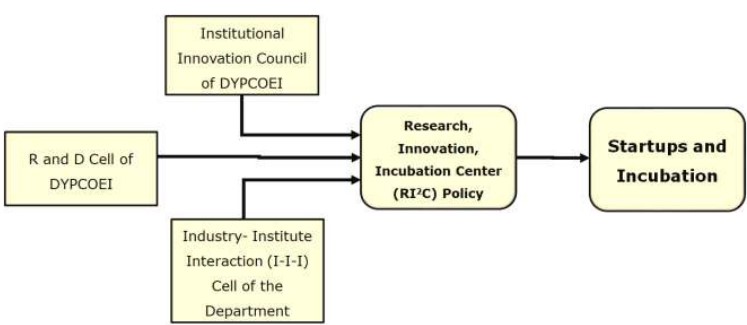RI2C Opportunity
Vision of RI2C
To develop a research and innovation ecosystem on campus in various upcoming areas of technology with an emphasis on product development and be among the leading incubators/innovation canters.
Mission of RI2C
Objectives of RI2C
- To encourage innovative ideas and creativity in the areas of cutting-edge technology by cultivating the research culture.
- Motivating the students and encouraging them to take up entrepreneurship as a preferred career choice.
- To enable the students, faculty, and staff for their active participation in innovation and entrepreneurship related activities.
- To facilitate students, faculty, and staff in terms of Intellectual Property Right (IPR) management, idea licensing and creating the business models.
- To establish a dynamic live startup ecosystem across all the departments using industry-institute-interactions.
- To establish a mechanism for knowledge generation and its commercialization.
- Demonstrate application of cutting-edge technology through various workshops, experts, hand-on sessions.
- To interact with research organizations to provide basic knowledge of technologies and business ideas.
- Support students, faculty, and staff financially while doing their research and development activities.
Strategies and Governance
Entrepreneurship is the process of establishing, developing, and executing a new commercial activity to generate profit while taking on financial risk. In a broader sense, entrepreneurship is the process of converting current situation by solving the most persistent problems often by introducing an innovative product, idea or service or creating new markets.
To facilitate development of an entrepreneurial ecosystem at DYPCOEI, specific objectives and associated performance indicators will be defined for the assessment.
The agenda of RI2C will be the responsibility of principal, dean R & D and HoDs to bring required commitment and must be well understood by the higher management.
Plan of resource mobilization should be executed at DYPCOEI for supporting all potential pre-incubation, incubation infrastructure facilities at RI2C.
- Minimum 1% fund of the total annual budget of DYPCOEI will be allocated to RI2C for funding and supporting innovation and startup related activities across all the departments.
- Faculty and staff will strive to bring in external funding through government (state and central) such as DST, DBT, MHRD, AICTE, TDB, TIFAC, DSIR, CSIR, BIRAC, NSTEDB, NRDC etc.
- To support technology incubators, DYPCOEI may approach to industry to generate funds, under Corporate Social Responsibility (CSR).
- The DYPCOEI may also raise funding through sponsorships and donations from the alumni. The DYPCOEI will actively engage the alumni network to promote RI2C.
- To speed up the decision making, the approval process will directly handled by the principal and the concerned faculty as individual autonomy and ownership of initiatives to be promoted.
- To promote innovation and entrepreneurial agenda across the institute and every individual, the activity will be presented and highlighted at institutional programs such as induction program, parent teacher meet, DAB, CDC and GB meet, conferences, FDPs etc.
- Lab to market strategy and mindset of faculty and student for startups will be developed by the institute on project-to-project basis by the HoDs and principal.
- Total transparency will be maintained among all the stakeholders at all the stages in RI2C.
- To develop entrepreneurship culture will not be limited within the boundaries of the DYPCOEI. There will be driving force from DYPCOEI to develop entrepreneurship culture in its vicinity of Varale and Talegaon Maval. This may include giving opportunity for regional startups, provision to extend facilities for outsiders in the campus and active involvement of the institute faculty while defining strategic direction for local growth.
Various activities to promote RI2C are as follows:
- Establish innovation ecosystems at RI2C and try to contribute in the start-up system in various roles depending upon the interest of individual.
- Inculcate commercialization approach within inventors and entrepreneurs both inside and outside the campus.
- Inspire social innovation towards the achievement of comprehensive solutions for the problems of the society.
- Let DYPCOEI be the Partner while going from LAB to Market for specific solutions to community while overcoming the challenges coming across.
- Support linkages between national level developmental institutions dedicated to entrepreneurship development and financial institutions for start- up promotion.
- Offer necessary support to faculty and students to explore innovative ideas while developing new products, processes, and services.
- The process of development will be open and will have different objectives which will be taken into consideration while working on the problem.
- The time bound activities will be executed and promoted to achieve developments in the start-up activities.
- The management is going to promote proactive innovative ideas to achieve revolutions that will progressively give better performance in the products or services which we are looking for
Institute Cells, infrastructure and policy will give the expected output of startup and incubation as given in the following figure.

Institution’s Innovation Council (IIC) of DYPCOEI: Institute has established its IIC as per the AICTE guideline and its composition of the Institution Innovation Council’s will be in line with the composition prescribed by AICTE guideline from time to time.
Research & Development Cell (R&D Cell): The function of the R&D cell is to encourage the faculty and students in the area of Research by providing seed funds by the management for implementing their innovative research and product development ideas.
Industry- Institute- Interaction (I-I-I) Cell: The function of this Cell is to promote closer interaction between DYPCOEI and industry. Industry Interaction Cell is established to provide closer links with industries. The purpose of the cell is to find out the gap between the need of the industry and the end product of the institute.
Nurturing Innovations and Startups: The DYPCOEI is expecting establishment of processes and mechanisms for easy creation and nurturing of Startups by students, faculty and staff including alumni and potential start up applicants even from outside the campus.




